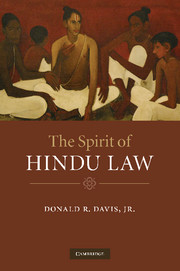Book contents
- Frontmatter
- Contents
- List of tables
- Preface
- Acknowledgments
- List of abbreviations
- Introduction (dharmaśāstra)
- 1 Sources and theologies (pramāṇa)
- 2 Hermeneutics and ethics (mīmāṃsā)
- 3 Debt and meaning (ṛṇa)
- 4 Persons and things (svatva)
- 5 Doubts and disputes (vyavahāra)
- 6 Rectitude and rehabilitation (daṇḍa)
- 7 Law and practice (ācāra)
- Conclusion
- Bibliography
- Index
4 - Persons and things (svatva)
Published online by Cambridge University Press: 26 February 2010
- Frontmatter
- Contents
- List of tables
- Preface
- Acknowledgments
- List of abbreviations
- Introduction (dharmaśāstra)
- 1 Sources and theologies (pramāṇa)
- 2 Hermeneutics and ethics (mīmāṃsā)
- 3 Debt and meaning (ṛṇa)
- 4 Persons and things (svatva)
- 5 Doubts and disputes (vyavahāra)
- 6 Rectitude and rehabilitation (daṇḍa)
- 7 Law and practice (ācāra)
- Conclusion
- Bibliography
- Index
Summary
The social person is fractured in Hindu jurisprudence. The integrity of the individual is not defined through assertions of basic rights or strict boundaries of body and spirit. Individuals act, but they act in social roles that only collectively define their worldly persona. The fractured nature of people's relationship to things signals and in part creates the fractured state of the social self in Hindu jurisprudence. Here, as before, the higher self, the famous ātman of Hindu philosophy, is not in question, nor is it understood to be anything but whole and eternal. Rather, Dharmaśāstra recognizes a social self (cf. bhūtātman in MDh 12.12) as a kind of legal fiction that promotes a multiplicity of dharmas that tend to fragment a person into differing and distinct roles. Svatva, property or ownership, concerns the way in which our interactions with material objects define us socially and legally, and in some views theologically as well. As in Christianity, therefore, “Property is an analogy for the human condition theologically understood … because the nature of being human reflects, refracts, and refines the nature and function of property.”
In this chapter, I explore Dharmaśāstra views on the law of things, the substantive complement to the law of persons discussed in the previous chapter. After surveying some important theoretical opinions about the nature of property and ownership in the long history of Hindu jurisprudence, I look at the ways in which owning particular things corresponds to the projection of certain social persona.
- Type
- Chapter
- Information
- The Spirit of Hindu Law , pp. 89 - 107Publisher: Cambridge University PressPrint publication year: 2010



